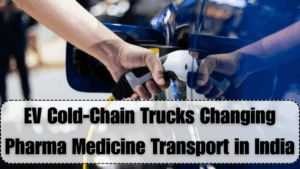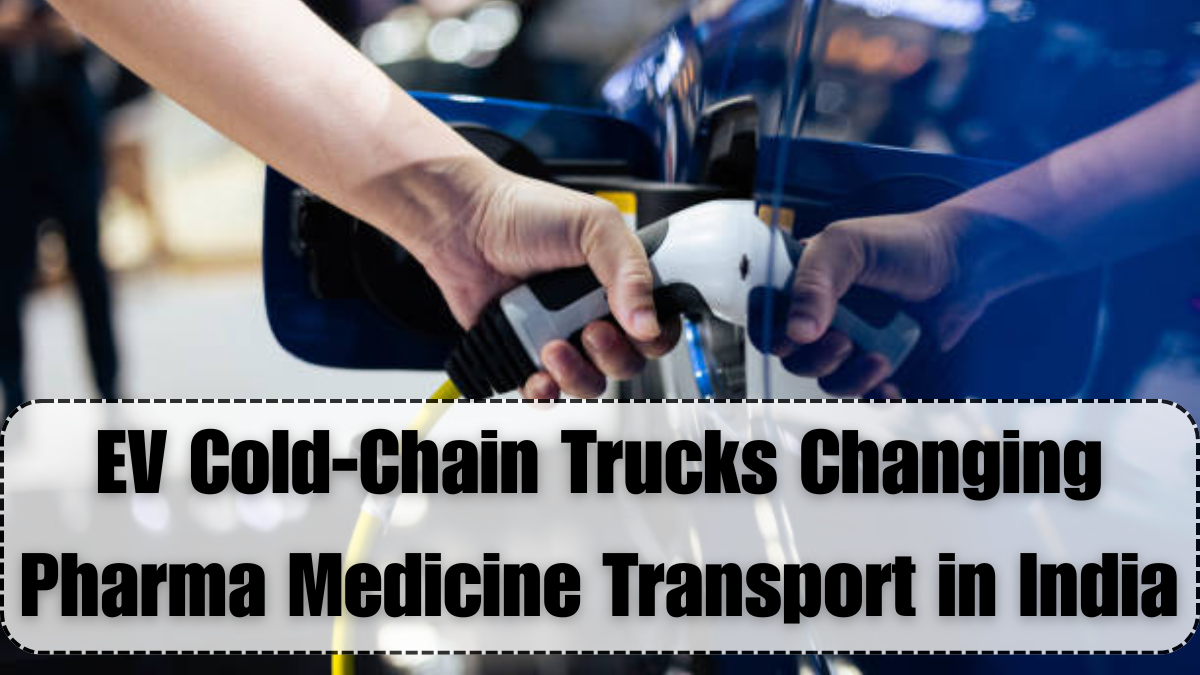EV pharma cold chain logistics are now playing a transformative role in the Indian pharmaceutical sector. With the rising demand for fast and temperature-sensitive medicine transport, electric cold-chain trucks are offering a cleaner, quieter, and highly efficient solution for pharmaceutical companies. These vehicles are equipped with advanced battery packs, precise temperature control units, and GPS monitoring systems, ensuring that vaccines, biologics, and temperature-sensitive drugs reach hospitals and dispensaries without spoilage.
Many pharma companies and medical logistics providers have adopted pharma EVs for last-mile delivery and inter-city transport. The shift from diesel-powered reefers to electric trucks has reduced fuel costs, carbon emissions, and operational noise levels. This sustainable transition is also aligned with India’s goal of becoming a global hub for pharmaceutical exports, where reliable delivery chains are non-negotiable.

How EV Cold-Chain Logistics Work
EV cold-chain vehicles are specially designed to carry sensitive medical cargo in a controlled environment. These electric trucks are built with insulated refrigerated compartments that maintain a consistent temperature range, typically between 2°C to 8°C, depending on the type of medicine being transported.
Key components of EV pharma cold chain vehicles:
-
Lithium-ion battery systems for both propulsion and refrigeration
-
Solar-assisted charging in select models for enhanced energy efficiency
-
Real-time temperature monitoring with alert systems
-
Insulated reefer containers for long-range, low-loss cooling
-
Low-noise operations, ideal for hospital zones and urban areas
This makes EV pharma cold chain vehicles ideal for transporting vaccines, insulin, blood samples, and biotech medicines over short and medium-range distances.
Benefits Over Traditional Diesel Reefers
Switching to pharma EVs offers significant economic and environmental advantages. While the initial cost of electric cold-chain trucks may be slightly higher, the savings over time — especially on fuel and maintenance — make them a cost-effective solution.
Advantages of EV cold-chain trucks include:
-
Lower operating cost (no diesel, fewer moving parts)
-
Reduced CO2 and NOx emissions
-
Improved delivery timing due to route tracking and fewer breakdowns
-
Eligibility for government subsidies and green incentives
-
Brand reputation boost as a green logistics adopter
With sustainability now a major pillar in pharma export compliance, EV pharma cold chain vehicles are setting new standards.
Adoption by Pharma Logistics Companies
Major Indian medical logistics companies and hospital supply chains are now integrating cold chain EVs into their fleets. Cities like Mumbai, Hyderabad, Ahmedabad, and Bengaluru have already seen successful deployment of refrigerated electric trucks for pharma delivery. These are being used for both wholesale distribution to medical stores and direct delivery to pathology labs and clinics.
Some players also operate hybrid models — combining pharma EVs for last-mile operations and larger refrigerated vans for long-distance supply. As EV infrastructure improves, this hybrid model is expected to shift completely toward electric operations.
FAQs
What is an EV pharma cold chain truck?
It is an electric vehicle designed with refrigerated compartments to transport temperature-sensitive medicines and vaccines safely across short and mid-range distances.
How is it different from diesel cold-chain vehicles?
Electric trucks operate with zero tailpipe emissions, low noise, and high efficiency. They also have fewer maintenance issues compared to diesel reefers.
Can EVs maintain low temperatures over long distances?
Yes, advanced pharma EVs come with high-capacity batteries and insulated containers that keep temperatures stable for several hours.
Are there any pharma companies currently using this in India?
Yes, several pharma logistics providers in metro cities have adopted EV cold chain trucks for medicine and vaccine delivery.
Do these vehicles qualify for government subsidies?
Yes, electric trucks used in cold-chain pharma logistics are eligible for FAME II subsidies and other state-level EV incentives.
Click here to know more.
